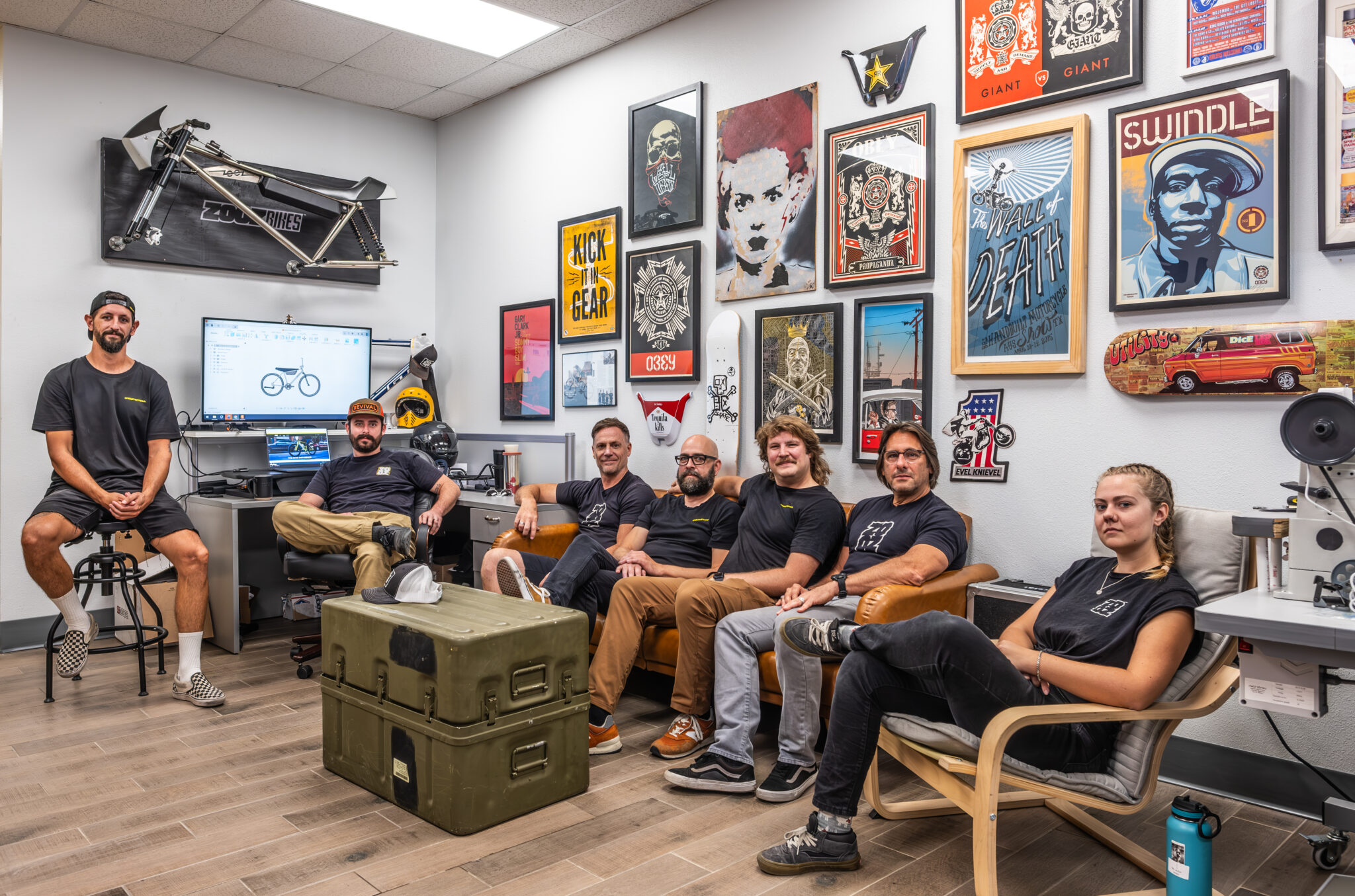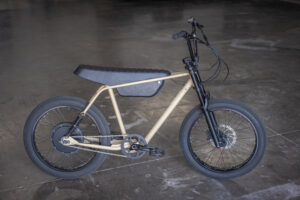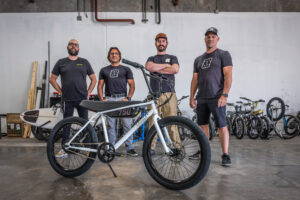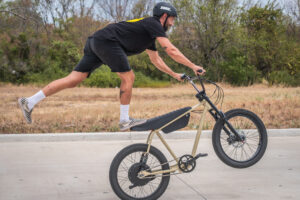
Zooz E-bikes: Where style meets performance in electric cycling
By Tori Couch
Photography By Olaf Growald
Zooz Bikes’ founders are on a roll in west Fort Worth, but they aren’t producing just any old e-bike
With just one glimpse of a Zooz bike, it’s clear this is not an ordinary ride.
The 4130 Chromoly steel frame’s shape is reminiscent of BMX bikes. A long seat, akin to one on a motorcycle, sits on top of a battery and hides the wiring. High handlebars encourage an upright, squared and natural riding position.
Purposely mixing all these design elements together gives the Fort Worth-based electric bike company’s product a very distinctive look.

“It’s called the design language, and it’s recognizable from across the street,” Zooz Bikes co-founder Pete Kelly said. “That is one of the most difficult things to achieve. We achieved it. We have a design patent on it. It’s Zooz.”
Zooz e-bikes hit the market in 2020. Since then, Zooz Bikes has sold more than 4,000 e-bikes while gaining an international presence.
The company’s origins can be traced to 2017 and co-founder Chris Zahner’s dislike for traffic.
Kelly, an industrial designer who worked at the headphone company Skullcandy, and fellow co-founder Michael Baker, who owns a Royal Enfield motorcycle franchise in Fort Worth, joined Zahner in 2018. Cofounder James Milam came aboard during the fall of 2020, with nearly two decades of manufacturing operations experience.
Most recently, Zooz released the Ultra Flex 1200 model. The Flex has full suspension and a higher seat than other models. Zooz currently offers three e-bikes on its website. The Ultra Urban 750, which weighs 55 pounds, the Ultra Urban 1100, which weighs 65 pounds, and the Flex, which weighs 85 pounds. Housing the rechargeable battery under the seat keeps the e-bike as light as possible and visually appealing, Zahner said.
The Flex and Ultra Urban 1100 can reach 30 miles per hour at top speed and have a range, or battery life, of 30- 45 miles. When riding, a cyclist can fully rely on the throttle or supplement the throttle by pedaling. The co-founders know speed and range are concerns for buyers, but they caution against searching for the flashiest specifications.
“We’re not the fastest,” Zahner said. “We don’t have the most range, but if you come up with the most balanced approach, pound for pound, we decimate the competition.”
Zooz plans more Ultra series e-bikes for release over the next 12-24 months, with XL, sport and mini models coming up.
Zoozers, or Zooz riders, have become an important part of the Zooz brand alongside the unique design. Their feedback inspired some of the changes made on the Flex model.
Riders have also created social media groups where they can share e-bike tips, organize rides and help new Zoozers understand the e-bike world. Zoozers come from a wide range of backgrounds and use the e-bikes for everything from commuting to and from work to running errands and riding recreationally.
“It’s one of these things that transcends more than just a bike,” Zahner said. “It’s the experience, it’s the community, it’s the interaction from the owner to their bike, and then with the brand online and how do we cinch all that together.”
Zahner, a Florence Design Academy graduate, built the first versions of Zooz e-bikes while living in Chicago.
By the time he landed there, he had graduated college, finished design school, traveled internationally, produced films and worked in a hot rod shop. He took his first motorcycle ride during college, which inspired custom motorcycle projects.

“I’ve been building things with motors and wheels for as long as I can remember,” Zahner said. “Like a toddler-reaching-for-power-tools type thing. Always interested in excitement, speed, motors, wheels, cars.”
In Chicago, Zahner’s garage was about 2 miles from his downtown apartment. The commute took 45 minutes by car or subway, a time Zahner deemed far too long. Creative juices started flowing, and he built an e-bike using parts bought off the e-commerce wholesaler Alibaba.
Suddenly, his 2-mile commute dropped to eight minutes.
Zahner posted about the new e-bike on social media, where Kelly watched the story unfold.
The two bike enthusiasts had met through a mutual friend at the 2017 MotoGP race in Austin. The pair followed each other on social media and connected at the same event a year later.
Between those two meetings, Zahner built the initial e-bike. He finished the second version, featuring major improvements, a week after the 2018 race in Austin. That prompted Kelly to send $2,500 for an e-bike.
Zahner and Kelly made a “spit” agreement to start a business together over Fourth of July weekend 2018.
Baker joined a couple weeks before Zooz launched in October 2018. Baker and Zahner connected through the internet. Zahner had produced what he calls a “people’s history” video about the Royal Enfield motorcycle brand that caught Baker’s attention. Online correspondence eventually turned into a friendship and a visit to Chicago.

“Huge supporter of [Chris] once I met him and we got to know each other,” Baker said. “What do you need? What can I do? I love this journey we’re on. … I like supporting him because I believe in his ideas.”
Baker’s motorcycle shop served as Zooz’s headquarters early on, even though no other co-founder lived in Fort Worth at the time.
The trio’s first fundraising campaign aimed at selling an initial model failed to raise enough money. Zahner admits the company moved too quickly, but they learned several lessons through the campaign. A redesigned e-bike launched for presale in January 2020, followed by Zooz’s first order for parts to build and sell bikes, Zahner said.
The assembly process for some of those first e-bikes incorporated Zahner, Kelly and Baker. On a hot Fourth of July weekend, the co-founders, friends and family assembled 100 e-bikes at Baker’s warehouse.
“The bikes were awesome,” Kelly said. “People are still putting thousands of miles on them today. It worked out well. It was a well-built machine.”
Zahner called the end result a “smashing success.” Still, he knew the growing business needed more support. Milam, who had worked with Kelly at Skullcandy, stepped in to scale and streamline production.
He strengthened Zooz’s relationship with its current manufacturer during a time when international travel was nearly impossible because of the COVID-19 pandemic. COVID did bring some positives for the young company, though.
“Bicycle and electric bicycle sales absolutely exploded,” Milam said. “There was a time in 2020, 2021 when you couldn’t get bicycles. You couldn’t go to a bicycle store and get one.”
Zooz felt those effects, too, with its e-bikes either back-ordered or out of stock. Many customers waited nearly 20 months before receiving their prepaid product, Zahner said.
The delivery process is much smoother now.
A Chinese manufacturer produces the e-bikes, and a 7,500-square-foot warehouse in west Fort Worth has been Zooz’s headquarters for shipping, receiving, marketing, design, brand management and logistics since October 2021. Bikes sit on desks and hang on office walls. Among those bikes is one of the first e-bikes Zahner built in Chicago.
The co-founders chose to live and work in Cowtown because of Texas’ business-friendly environment, ease of access to the Metroplex and opportunities for growth, Zahner said.
Currently, the majority of Zooz’s e-bikes — 80 percent, Milam said — are sold online, direct-to-consumer. The other sales happen through dealerships.
On a warehouse wall, a U.S. map has pushpins in the different cities where a dealer sells Zooz Bikes. Fort Worth, Houston, San Antonio, Austin and Galveston highlight the Texas locations. Florida, New York, Pennsylvania, Iowa, Illinois, Ohio, Oregon, Arizona, California, Nevada, Colorado and Hawaii have at least one pin.

Zooz’s international reach includes Australia and the United Kingdom. Milam said the company wants to gradually increase the percentage of sales coming from dealerships. Finding the right distributors, though, is a very deliberate and selective process.
“We have a national sales manager who goes on the road, drops into these shops and does a full audit,” Milam said. “He educates them, gets them excited and takes them on bike rides. Those shops are very successful for us. We want to continue to grow, but we’re not gonna do it at the expense of putting it into the wrong places.”
Zooz Bikes will also attend trade shows and community events, so potential customers can try the e-bike, see how it differs from a regular bike and make informed decisions.
“It’s a great cruiser, comfortable, but if you have skills, that thing can handle trick riding,” Kelly said. “People who grew up riding can look at it and know they can ride the hell out of that thing.”
Newly purchased e-bikes require minimal assembly. Zoozers can assemble the e-bike at home with the assistance of videos found on the ZoozBikes YouTube Channel or have a bike shop put it together.
Zoozers can also trick out their e-bike as little or as much as they want. Accessories such as baskets, surfboard racks and racks for the front or back of the e-bike are sold through the Zooz website.
The e-bike’s “versathrillity,” as Zahner calls it, makes the product appealing to riders of all ages, experience levels and backgrounds. The wordplay also ties in with the company’s motto — “Feel The Thrill.”
Baker used this phrase after riding an early version of the e-bike in Chicago. Breathless from the test run, he could barely get the words out.
That phrase is now painted in big black letters on an office wall.
“It somehow just popped,” Baker said. “That and going back to feeling like the first time you ever rode a motorcycle. … It gives them that feeling which gives them life again. I got all of that in that ride on that product. It was just fun.”
THE DETAILS
Zooz Bikes currently offers three e-bikes on its website, zoozbikes.com. The Ultra Urban 750 weighs 55 pounds and has a list price of $1,995, the Ultra Urban 1100 weighs 65 pounds and costs $2,395 and the Ultra Flex 1200 costs $3,295 and weighs 85 pounds. More models are coming.
